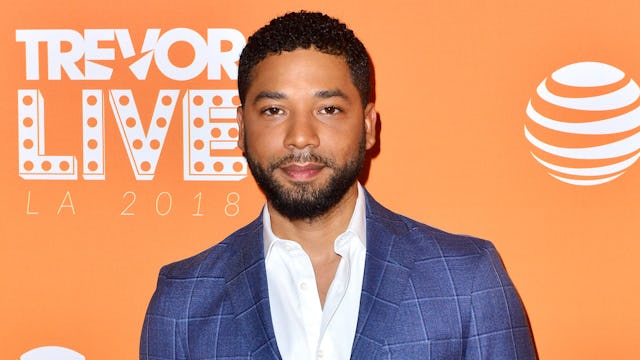Jussie Smollett’s Been Arrested — But That Doesn’t Mean We Shouldn’t Believe Survivors

One outlier shouldn’t dismantle our belief in victims
Jussie Smollett was arrested this morning. Chicago police say he filed a false report when he claimed he was attacked by two men who shouted racist and homophobic slurs last month, and early today, the Empire star turned himself in.
Smollett has been charged with a felony count of disorderly conduct.
He still maintains that the event did happen as he reported it, and his lawyers said in a statement, “Like any other citizen, Mr. Smollett enjoys the presumption of innocence, particularly when there has been an investigation like this one where information, both true and false, has been repeatedly leaked. Given these circumstances, we intend to conduct a thorough investigation and to mount an aggressive defense.”
It’s true. Smollett is an American citizen, which gives him the right to the presumption of innocence until he’s proven guilty in court. But even if Smollett did lie, it doesn’t mean we shouldn’t believe victims.
People are going to use this highly public example to try to say that victims of hate crimes, of sexual assault, of rape, shouldn’t be believed. But they should. We were right to believe Smollett. Victims deserve our belief and support.
The reality is that false reports of crimes are rare. There aren’t a lot of actual statistics about the rate at which crimes are falsely reported, but Brian Levin, director of The Center for the Study of Hate and Extremism at California State University in San Bernardino, told reporters in 2017 that false reports make up a “sliver” of all reported crimes.
“We do routinely see a very small number of hate crime hoaxes but we also see hoaxes with respect to arson and auto theft and even reports of sexual assault, yet we don’t say the overwhelming number of reports of those crimes are hoaxes, either,” he said.
A much larger problem is the number of hate crime that go unreported — the Bureau of Justice Statistics estimates that more than 100,000 hate crimes are committed in the U.S. each year that aren’t reported to the police. The fear of not being believed is something that stops victims of hate crimes and sexual assault from coming forward. That’s why we can’t let this stop us from continuing to believe victims.
Already, the online criticism is coming for people who publicly stated their support for Smollett, that they believed him. Those people should not be criticized. Smollett has not been found guilty, and even if he eventually is, no one should be criticized for believing a victim.
No matter what happens in Smollett’s case, that needs to be our takeaway. If Smollett lied, he committed a crime, but justice will be served. We cannot impede future justice by letting this color our view of survivors who come forward to seek it.
This article was originally published on